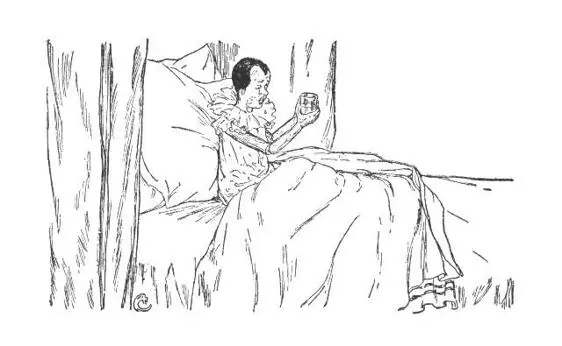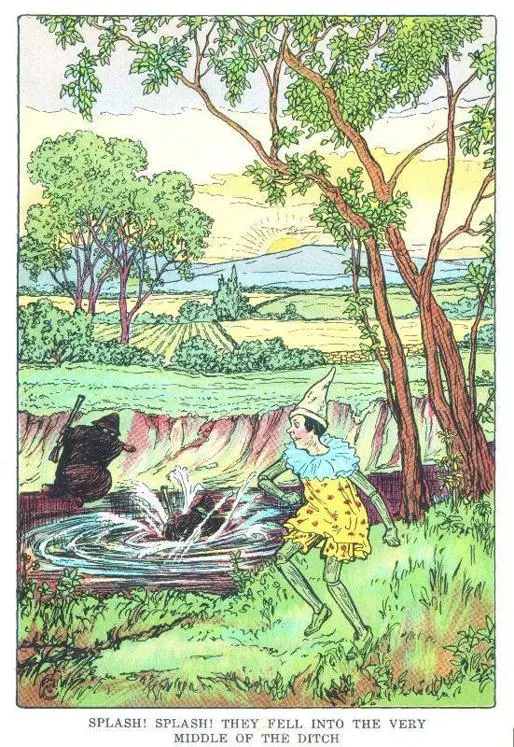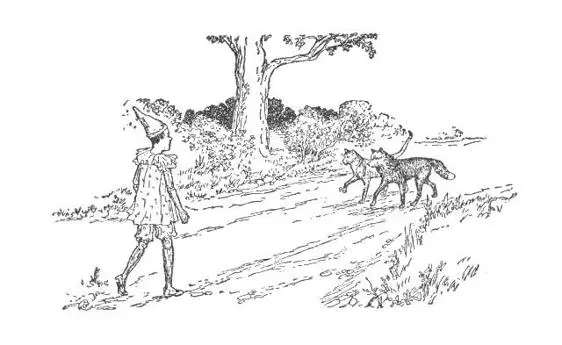Pick him up gently and lay him flat on the cushions of the carriage and bring him here to me. Do you understand?"
The Poodle, to show that he had understood, shook the case of blue satin three or four times and ran off like a race–horse.
Shortly afterwards a beautiful little carriage came out of the coach–house. The cushions were stuffed with canary feathers and it was lined on the inside with whipped cream, custard and vanilla wafers. The little carriage was drawn by a hundred pairs of white mice, and the Poodle, seated on the coach–box, cracked his whip from side to side like a driver when he is afraid that he is behind time.
Scarcely had a quarter of an hour passed, when the carriage returned. The Fairy, who was waiting at the door of the house, took the poor puppet in her arms and carried him into a little room that was wainscoted with mother–of–pearl. She sent at once to summon the most famous doctors in the neighborhood.
They came immediately, one after the other: namely, a Crow, an Owl, and a Talking–Cricket.
"I wish to know from you, gentlemen," said the Fairy, "if this unfortunate puppet is alive or dead!"
At this request the Crow, advancing first, felt Pinocchio's pulse; he then felt his nose and then the little toe of his foot: and, having done this carefully, he pronounced solemnly the following words:
"To my belief the puppet is already quite dead; but, if unfortunately he should not be dead, then it would be a sign that he is still alive!"
"I regret," said the Owl, "to be obliged to contradict the Crow, my illustrious friend and colleague; but, in my opinion the puppet is still alive; but, if unfortunately he should not be alive, then it would be a sign that he is dead indeed!"
"And you—have you nothing to say?" asked the Fairy of the Talking–Cricket.
"In my opinion, the wisest thing a prudent doctor can do, when he does not know what he is talking about, is to be silent. For the rest, that puppet there has a face that is not new to me. I have known him for some time!"
Pinocchio, who up to that moment had lain immovable, like a real piece of wood, was seized with a fit of convulsive trembling that shook the whole bed.
"That puppet there," continued the Talking–Cricket, "is a confirmed rogue."
Pinocchio opened his eyes, but shut them again immediately.
"He is a ragamuffin, a do–nothing, a vagabond."
Pinocchio hid his face beneath the clothes.
"That puppet there is a disobedient son who will make his poor father die of a broken heart!"
At that instant a suffocated sound of sobs and crying was heard in the room. Imagine everybody's astonishment when, having raised the sheets a little, it was discovered that the sounds came from Pinocchio.
"When a dead person cries, it is a sign that he is on the road to get well," said the Crow solemnly.
"I grieve to contradict my illustrious friend and colleague," added the Owl; "but for me, when the dead person cries, it is a sign that he is sorry to die."

CHAPTER XVII
PINOCCHIO WILL NOT TAKE HIS MEDICINE
As soon as the three doctors had left the room the Fairy approached Pinocchio and, having touched his forehead, she perceived that he was in a high fever.
She therefore dissolved a certain white powder in half a tumbler of water and, offering it to the puppet, she said to him lovingly:
"Drink it and in a few days you will be cured."
Pinocchio looked at the tumbler, made a wry face, and then asked in a plaintive voice:
"Is it sweet or bitter?"
"It is bitter, but it will do you good."
"If it is bitter, I will not take it."
"Listen to me: drink it."
"I don't like anything bitter."
"Drink it, and when you have drunk it I will give you a lump of sugar to take away the taste."
"Where is the lump of sugar?"
"Here it is," said the Fairy, taking a piece from a gold sugar–basin.
"Give me first the lump of sugar and then I will drink that bad bitter water."
"Do you promise me?"
"Yes."
The Fairy gave him the sugar and Pinocchio, having crunched it up and swallowed it in a second, said, licking his lips:
"It would be a fine thing if sugar were medicine! I would take it every day."
"Now keep your promise and drink these few drops of water, which will restore you to health."
Pinocchio took the tumbler unwillingly in his hand and put the point of his nose to it: he then approached it to his lips: he then again put his nose to it, and at last said:
"It is too bitter! too bitter! I cannot drink it."
"How can you tell that, when you have not even tasted it?"
"I can imagine it! I know it from the smell. I want first another lump of sugar and then I will drink it!"
The Fairy then, with all the patience of a good mamma, put another lump of sugar in his mouth, and again presented the tumbler to him.
"I cannot drink it so!" said the puppet, making a thousand grimaces.
"Why?"
"Because that pillow that is down there on my feet bothers me."
The Fairy removed the pillow.
"It is useless. Even so I cannot drink it."
"What is the matter now?"
"The door of the room, which is half open, bothers me."
The Fairy went and closed the door.
"In short," cried Pinocchio, bursting into tears, "I will not drink that bitter water—no, no, no!"
"My boy, you will repent it."
"I don't care."
"Your illness is serious."
"I don't care."
"The fever in a few hours will carry you into the other world."
"I don't care."
"Are you not afraid of death?"
"I am not in the least afraid! I would rather die than drink that bitter medicine."
At that moment the door of the room flew open and four rabbits as black as ink entered carrying on their shoulders a little bier.
"What do you want with me?" cried Pinocchio, sitting up in bed in a great fright.
"We have come to take you," said the biggest rabbit.
"To take me? But I am not yet dead!"
"No, not yet? but you have only a few minutes to live, as you have refused the medicine that would have cured you of the fever."
"Oh, Fairy, Fairy!" the puppet then began to scream, "give me the tumbler at once; be quick, for pity's sake, for I will not die—no, I will not die."
And, taking the tumbler in both hands, he emptied it at a gulp.
"We must have patience!" said the rabbits; "this time we have made our journey in vain." And, taking the little bier again on their shoulders, they left the room, grumbling and murmuring between their teeth.
In fact, a few minutes afterwards, Pinocchio jumped down from the bed quite well, because wooden puppets have the privilege of being seldom ill and of being cured very quickly.
The Fairy, seeing him running and rushing about the room as gay and as lively as a young cock, said to him:
"Then my medicine has really done you good?"
"Good? I should think so! It has restored me to life!"
"Then why on earth did you require so much persuasion to take it?"
"Because you see that we boys are all like that! We are more afraid of medicine than of the illness."
"Disgraceful! Boys ought to know that a good remedy taken in time may save them from a serious illness, and perhaps even from death."
"Oh! but another time I shall not require so much persuasion. I shall remember those black rabbits with the bier on their shoulders and then I shall immediately take the tumbler in my hand, and down it will go!"
"Now, come here to me and tell me how it came about that you fell into the hands of those assassins."
"You see, the showman, Fire–Eater, gave me some gold pieces and said to me: "Go, and take them to your father!" and instead I met on the road a Fox and a Cat, who said to me: "Would you like those pieces of gold to become a thousand or two? Come with us and we will take you to the Field of Miracles," and I said: "Let us go." And they said: "Let us stop at the inn of The Red Craw–Fish," and after midnight they left. And when I awoke I found that they were no longer there, because they had gone away. Then I began to travel by night, for you cannot imagine how dark it was; and on that account I met on the road two assassins in charcoal sacks who said to me: "Out with your money," and I said to them: "I have got none," because I had hidden the four gold pieces in my mouth, and one of the assassins tried to put his hand in my mouth, and I bit his hand off and spat it out, but instead of a hand it was a cat's paw. And the assassins ran after me, and I ran, and ran, until at last they caught me and tied me by the neck to a tree in this wood, and said to me: 'Tomorrow we shall return here and then you will be dead with your mouth open and we shall be able to carry off the pieces of gold that you have hidden under your tongue."
"And the four pieces—where have you put them?" asked the Fairy.
"I have lost them!" said Pinocchio, but he was telling a lie, for he had them in his pocket.
He had scarcely told the lie when his nose, which was already long, grew at once two inches longer.
"And where did you lose them?"
"In the wood near here."
At this second lie his nose went on growing.
"If you have lost them in the wood near here," said the Fairy, "we will look for them and we shall find them: because everything that is lost in that wood is always found."
"Ah! now I remember all about it," replied the puppet, getting quite confused; "I didn't lose the four gold pieces, I swallowed them whilst I was drinking your medicine."
At this lie his nose grew to such an extraordinary length that poor Pinocchio could not move in any direction. If he turned to one side he struck his nose against the bed or the window–panes, if he turned to the other he struck it against the walls or the door, if he raised his head a little he ran the risk of sticking it into one of the Fairy's eyes.
And the Fairy looked at him and laughed.
"What are you laughing at?" asked the puppet, very confused and anxious at finding his nose growing so prodigiously.
"I am laughing at the lie you have told."
"And how can you possibly know that I have told a lie?"
"Lies, my dear boy, are found out immediately, because they are of two sorts. There are lies that have short legs, and lies that have long noses. Your lie, as it happens, is one of those that have a long nose."
Pinocchio, not knowing where to hide himself for shame, tried to run out of the room; but he did not succeed, for his nose had increased so much that it could no longer pass through the door.

SPLASH! SPLASH! THEY FELL INTO THE VERY MIDDLE OF THE DITCH

CHAPTER XVIII
PINOCCHIO AGAIN MEETS THE FOX AND THE CAT
The Fairy allowed the puppet to cry for a good half–hour over his nose, which could no longer pass through the door of the room. This she did to give him a severe lesson, and to correct him of the disgraceful fault of telling lies—the most disgraceful fault that a boy can have. But when she saw him quite disfigured and his eyes swollen out of his head from weeping, she felt full of compassion for him. She therefore beat her hands together and at that signal a thousand large birds called Woodpeckers flew in at the window. They immediately perched on Pinocchio's nose and began to peck at it with such zeal that in a few minutes his enormous and ridiculous nose was reduced to its usual dimensions.
"What a good Fairy you are," said the puppet, drying his eyes, "and how much I love you!"
"I love you also," answered the Fairy; "and if you will remain with me you shall be my little brother and I will be your good little sister."
"I would remain willingly if it were not for my poor papa."
"I have thought of everything. I have already let your father know, and he will be here tonight."
"Really?" shouted Pinocchio, jumping for joy. "Then, little Fairy, if you consent, I should like to go and meet him. I am so anxious to give a kiss to that poor old man, who has suffered so much on my account, that I am counting the minutes."
"Go, then, but be careful not to lose yourself. Take the road through the wood and I am sure that you will meet him."
Pinocchio set out, and as soon as he was in the wood he began to run like a kid. But when he had reached a certain spot, almost in front of the Big Oak, he stopped, because he thought he heard people amongst the bushes. In fact, two persons came out on to the road. Can you guess who they were? His two traveling companions, the Fox and the Cat, with whom he had supped at the inn of The Red Craw–Fish.
"Why, here is our dear Pinocchio!" cried the Fox, kissing and embracing him. "How came you to be here?"
"How come you to be here?" repeated the Cat.
"It is a long story," answered the puppet, "which I will tell you when I have time.
1 comment